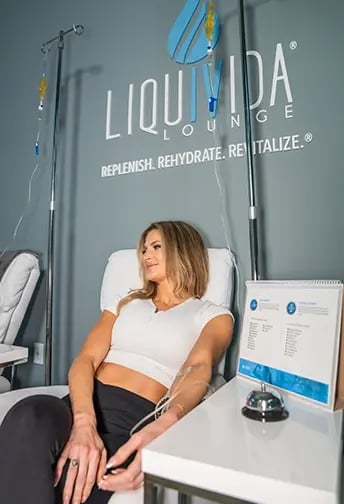A day like Valentine’s Day is about being close to those that we love. But if you were prevented from experiencing intimacy this past holiday, you may be worrying about your sexual health.
Sexual wellness is an important part of physical health regardless of anyone’s gender. Though the subject may be “taboo” in some generations, sexual intimacy is a human need that, when limited, can lead to emotional distress and relationship trouble. It is essential to our overall well-being. That’s why Liquivida® is a provider of both GAINSWave and FemiWave, two revolutionary treatments for erectile dysfunction and vaginal rejuvenation.
Both are non-invasive procedures that can yield the same-day results. But how do they work? This article breaks down both treatments so that you can understand the benefits before deciding if it’s time to book a consultation and feel your absolute best.
What leads to Erectile Dysfunction
Many factors can contribute to erectile dysfunction in men. While certain health conditions and medications can exaggerate symptoms, aging is possibly the most universal contributor because it impacts a very important factor: blood flow. Once a man turns 20, two physical changes begin.
First, the body stops generating as many blood vessels as it previously had. Having fewer channels to deliver blood flow can result in weaker erections over time. Then, micro-plaque begins to build up in the existing blood vessels, which further diminishes blood flow. By the time men reach the age of 30, they may begin to notice a significant change in their erections and orgasms. This is how erectile dysfunction begins. As time progresses, the lack of blood flow is often exaggerated by conditions like diabetes, high cholesterol, and low testosterone. This is what leads to the need for treatment.
How GAINSWave can help male performance, naturally
Without proper treatment, ED can lower one’s quality of life. Although there are medications that can be used as ED treatment, they are not always convenient for use. For some men, medications are even too dangerous for use because of certain medical conditions. GAINSWave is a shockwave therapy that makes the need for medications obsolete.
GAINSWave uses high-frequency, low-intensity sound waves to improve blood flow to the penis, break up microplaque in blood vessels, and help regenerate new blood vessels. This treatment is backed by clinical studies and boasts a greater than 75 percent success rate.
This treatment is non-invasive and safe. All that’s required is an in-office appointment. The best news is that there’s no recovery time. Patients can begin seeing the benefits of their treatment the very same night!

Why some women may need Shockwave Therapy?
Unfortunately, as a woman ages and has children, there is a chance that her sexual satisfaction will decline. After a woman reaches menopause and her body begins to go through hormonal changes, this dissatisfaction may worsen.
Often, these bodily changes make it more difficult for a woman’s body to create natural lubrication, which often makes it more difficult to achieve climax and lowers sex drive. Just like for men, this can lower a woman’s quality of life and negatively impact her relationship, making it important to address.
The benefits of FemiWave Vaginal Rejuvenation for women
FemiWave is a revolutionary technology from the makers of GAINSWave that’s designed to enhance female pleasure. This procedure helps increase vaginal sensitivity to produce stronger and more frequent orgasms, increase natural lubrication, and rejuvenate the vagina after childbirth. This procedure can also help treat urinary incontinence and can be enhanced by coupling it with certain PRP treatments.
So how does FemiWave work? It’s a shockwave therapy that delivers low-intensity sound waves to the inner and outer labia to restore sensation and natural lubrication. The sound waves increase blood flow to the area and activate the growth of healthy vaginal tissue. Many women report having increased sensations and shorter arousal time at just the beginning of their treatment. What’s best is that this procedure is non-invasive and not long-lasting.
Rather than taking drugs or subjecting oneself to lasers, a simple in-office appointment could provide the relief you’ve been looking for. There’s no recovery time so once again, patients can experience the difference the very same day or night!
How to move forward with Shockwave Therapy?
If you’re ready to reclaim your sexual health and satisfaction, then it may be time to start exploring your options for ED treatment or vaginal rejuvenation. Thankfully, Liquivida is a trusted provider of both of these treatments.
By calling to set up a consultation, you’ll be taking the first step needed to take control of this area of your life. Once you’ve selected a location, you’ll meet with our licensed providers to discuss whether these treatments will be a good fit for you. This complimentary consultation is where you’ll determine how many treatments you’d like to have. In general, patients receive anywhere from 6 to 12 sessions, and each one lasts around 20 minutes.
After receiving treatment, there’s no recovery time necessary! You can go back to your daily activities, which makes this treatment an easy addition to your routine, no matter how busy your schedule is.
Take control of your sex life. If you’re looking to get started, contact the Liquivida team to find out how GAINSWave and FemiWave may put you on the path to improved sexual wellness, boost your sexual performance, and prevent future performance issues.












 By Jake Muller
By Jake Muller

 By Liquivida®
By Liquivida®


